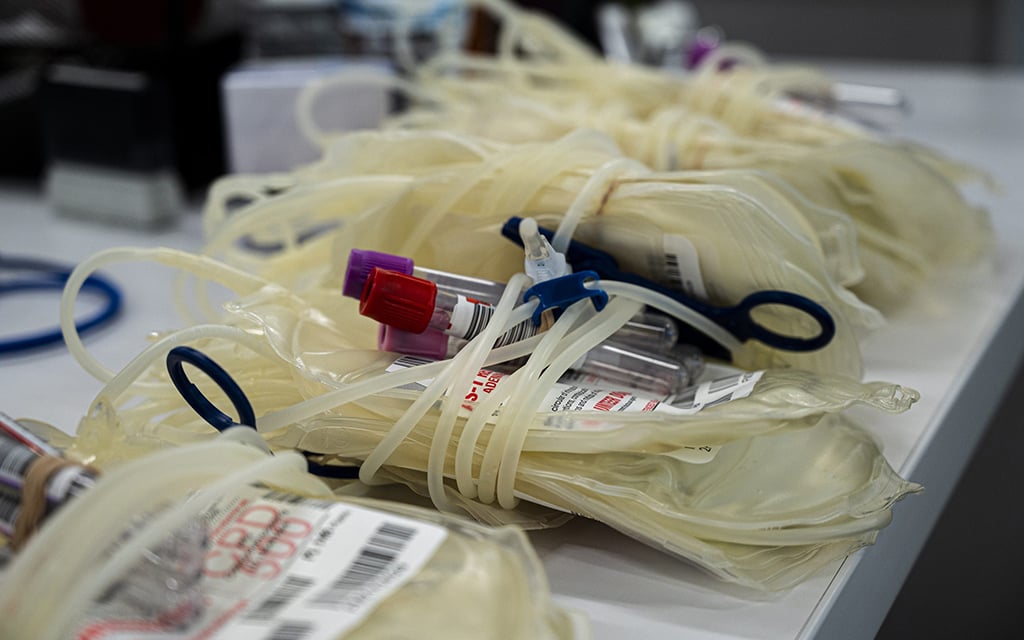PHOENIX – Arizona Attorney General Kris Mayes joined 21 other state attorneys general Friday in supporting a Food and Drug Administration proposal that would make it easier for LGBTQ individuals to donate blood and plasma.
Gay and bisexual men are currently barred from donating blood or plasma for three months after their most recent sexual contact with a man.
“Discriminatory blood donation policies not only stigmatize the LGBTQ community, and gay and bisexual men in particular, but also endanger the lives of patients in need,” Mayes said in a press release. “It’s long past time to abandon outdated practices and embrace a risk-based approach that allows all eligible donors to contribute to the blood supply. If implemented, the new guidance proposed by the Biden administration will undoubtedly save lives.”
Every two seconds someone in the U.S. needs blood, according to the American Red Cross, and one blood donation can save more than one life.
“Discriminatory restrictions against blood donation by healthy gay and bisexual Americans have persisted for far too long,” stated a letter signed by 22 state attorneys general, including Mayes. “Sound science, international experience, blood supply needs, and important civil rights principals all support this change.”
The letter indicated that in the past three decades, there has been no documentation of HIV transmissions through “U.S.-licensed plasma-derived products.”
Men who have sex with other men were banned from donating blood at the beginning of the HIV/AIDS epidemic in the 1980s. That ban was lifted in December 2015 and allowed gay and bisexual men who had not had sex with other men within the previous 12 months to donate blood. The time restriction was reduced to three months in April 2020, according to a policy history from the Human Rights Campaign.
The FDA shared a proposal on Jan. 27 that would replace time-based deferrals with an assessment of eligibility, regardless of gender or sexual orientation, through individual risk-based questions. The FDA said its proposal is in line with what is already being done in the United Kingdom and Canada.
Under the proposal, men who have had sex with men in the past three months would not automatically be disqualified. However, anyone, regardless of gender, who has had a new sexual partner or more than one partner, as well as anal sex within the past three months would be deferred to donate at another time.
There would be no change to the 12-month deferral period for people with other HIV risk factors, including exchanging sex for money or drugs, having a history of non-prescription injection drug use or having sex with someone who is HIV positive. In addition, any individual who tests positive for HIV or has taken medication to treat an HIV infection would continue to be deferred permanently.
Individuals who are taking oral medications to prevent HIV infection such as PrEP or PEP would have to wait to give blood until three months after their most recent dose. People who are taking injectable PrEP to prevent HIV would be deferred for two years from their most recent injection.
According to the FDA, PrEP and PEP may delay detection of HIV.
Blood banks would still be required to test all blood donations for HIV, hepatitis B and hepatitis C.
“This is a slow … moving process, and I think we’d see it moving much more quickly and would have seen this resolved a long time ago if there weren’t still some inherent discrimination,” Jeremy Helfgot, a spokesperson for Phoenix Pride, said of the FDA policies. “So hopefully we are finally getting past that stigma, and finally ready to restore equity to the blood donation process.”
Helfgot said the modification the FDA made several years ago to try and be more friendly and accessible – by cutting the deferral period for men having sex with men from 12 months to three – actually “rewarded less responsible behavior and punished individuals who may be in responsible long-term monogamous, healthy relationships, just because they were sexually active in those relationships.”
Helfgot added that when elected officials call for this kind of change, it strengthens the effort to see the policy through. The FDA will evaluate public comments on the proposal to decide whether to adopt it.
A May 2022 report from America’s Blood Center noted only 3% of the eligible U.S. population donates blood each year. About 51% of donors are men and 49% of donors are women.


